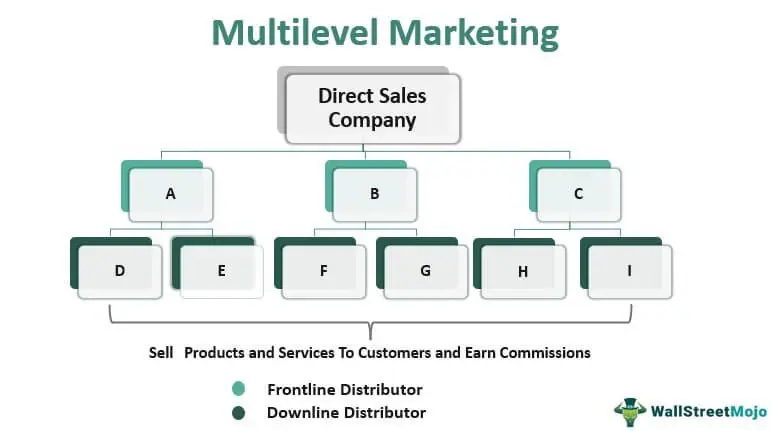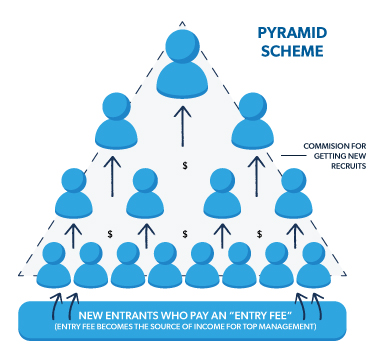
What is Multi-Level Marketing (MLM)?
Introduction to Multi-Level Marketing (MLM)
Multi-Level Marketing (MLM) is a business model that relies on recruiting people to sell the company's products or services to their network of friends, family, and acquaintances. MLM companies typically offer a tiered compensation plan, with commissions paid for sales generated by both the individual and their recruited sales team. MLM is also known as network marketing, direct selling, or referral marketing.
History and Development of MLM
The origins of MLM can be traced back to the 1920s when Nutrilite, now a subsidiary of Amway, was launched. However, it wasn't until the 1950s when the MLM industry really began to gain traction, with the founding of direct selling giants such as Tupperware, Mary Kay, and Avon.
Throughout the 1970s and 80s, MLM experienced exponential growth in the United States and around the world. By the 1990s, the MLM industry was estimated to generate sales of over $100 billion annually, with millions of independent distributors working for thousands of different MLM companies.
Despite its popularity, MLM has been the subject of much controversy, with critics arguing that the business model is characterized by predatory practices and high failure rates among distributors. Nonetheless, MLM continues to be a major force in the global economy, with many people attracted to the potential for financial freedom and flexible working hours that it offers.

How does Multi-Level Marketing (MLM) Work?
The basic structure of MLM
Multi-Level Marketing (MLM) is a business strategy that operates on a pyramid-like structure, with a company at the top and a network of salespeople below. These salespeople, also known as independent distributors, work to sell the company's products or services directly to consumers.The structure of MLM involves recruiting new people to become distributors, who then recruit others further down the line to form their sales team. Salespeople are compensated not only for their personal sales but also for the sales made by those they have recruited, creating a hierarchy of commissions that can extend multiple levels deep.
Compensation Plans in MLM
MLM companies typically offer various compensation plans to incentivize and reward distributors. The most common types of compensation plans include:- Unilevel Plan: Distributors earn commissions based on their personal sales and the sales of all the distributors they have recruited.
- Binary Plan: Distributors build two legs of a downline and earn commissions based on the weaker leg's sales.
- Matrix Plan: Distributors are limited in the number of their downline members, with a fixed number allowed per level and each distributor only able to sponsor a certain number of members.
Distributors may also receive bonuses, incentives, and other rewards for meeting certain sales quotas or achieving other milestones set by the MLM company.
While MLM can offer the potential for financial freedom and flexible working hours, it is crucial to carefully research and evaluate any MLM opportunity before joining. Critics of MLM warn of high failure rates, predatory practices, and the risk of losing money through investment in products, marketing materials, and fees required to participate.

Advantages of Multi-Level Marketing (MLM)
Flexibility in work schedule
One advantage of joining an MLM company is the flexibility it offers. As an independent distributor, you have the freedom to work on your own schedule and at your own pace. This can be especially beneficial if you have other commitments such as a full-time job or family responsibilities. MLM allows you to work from home or anywhere you choose, giving you the freedom to balance your work and personal life.
Low start-up costs
Compared to starting a traditional business, joining an MLM company requires relatively low start-up costs. Most MLM companies offer training and support to their distributors, so there is no need to invest in expensive education or training programs. Additionally, many MLM companies offer starter kits and other tools at a low cost to help their distributors get started.
While MLM can offer the potential for financial freedom and flexible working hours, it is important to research and evaluate any MLM opportunity before joining. Critics of MLM warn of high failure rates, predatory practices, and the risk of losing money through investment in products, marketing materials, and fees required to participate. However, for those who are willing to put in the effort and dedication, MLM can be a profitable and fulfilling business opportunity.
:max_bytes(150000):strip_icc()/MLM-TAERM-ADD-SOURCE-16091bd51da945f28fbd9522f5a173d6.jpg)
Advantages and Disadvantages of Multi-Level Marketing (MLM)
Advantages of Multi-Level Marketing (MLM)
One advantage of joining an MLM company is the flexibility it offers. As an independent distributor, you have the freedom to work on your own schedule and at your own pace. This can be especially beneficial if you have other commitments such as a full-time job or family responsibilities. MLM allows you to work from home or anywhere you choose, giving you the freedom to balance your work and personal life.
Compared to starting a traditional business, joining an MLM company requires relatively low start-up costs. Most MLM companies offer training and support to their distributors, so there is no need to invest in expensive education or training programs. Additionally, many MLM companies offer starter kits and other tools at a low cost to help their distributors get started.
Disadvantages of Multi-Level Marketing (MLM)
High failure rate
One major disadvantage of MLM is the high failure rate. A study conducted by the Federal Trade Commission found that over 99% of people who join MLM companies lose money. This is because MLM companies often require distributors to purchase products and marketing materials, which can be expensive and difficult to sell. Additionally, distributors are often encouraged to recruit more people to join the company, creating a pyramid structure that is unsustainable in the long run.
Predatory practices in MLM
Critics of MLM warn of predatory practices such as manipulation, deception, and cult-like behavior. MLM companies often use high-pressure sales tactics to convince people to join and buy their products. They may also make unrealistic income claims, promising huge earnings that are not attainable for the average distributor. Additionally, MLM companies may pressure distributors to cut ties with family and friends who are not interested in joining the business, creating a sense of isolation and dependency on the company.
While MLM can offer the potential for financial freedom and flexible working hours, it is important to research and evaluate any MLM opportunity before joining. Carefully consider the costs, risks, and potential benefits before making a decision.

Common Misconceptions about Multi-Level Marketing (MLM)
Pyramid schemes vs. MLM
Many people believe that MLM is synonymous with pyramid schemes, but this is not entirely accurate. Pyramid schemes are illegal and involve making money solely through recruiting others into the scheme. MLM, on the other hand, involves selling a legitimate product or service. While recruiting others to join the company is a part of MLM, distributors must also sell products in order to make money.MLM as a Get-Rich-Quick Scheme
Another common misconception about MLM is that it is a get-rich-quick scheme. In reality, it takes hard work, commitment, and time to build a successful MLM business. While it is possible to earn a significant income through MLM, it usually takes several years of consistent effort to reach that level. Distributors who expect quick and easy riches may be disappointed and ultimately drop out of the business.Overall, while MLM does have its advantages, there are also significant risks and potential drawbacks. It is important for individuals to do their due diligence and carefully consider all aspects of the business before deciding to join an MLM company. By understanding the common misconceptions about MLM, individuals can make a more informed decision about whether or not this type of business opportunity is right for them.

Common Misconceptions about Multi-Level Marketing (MLM)
Many people think of multi-level marketing (MLM) as a pyramid scheme, where distributors are encouraged to recruit as many people as possible to make money. However, this is not completely true. Pyramid schemes are illegal and involve making money solely through recruiting others into the scheme. In contrast, MLM involves selling a legitimate product or service while encouraging recruitment. Distributors must sell products to make money, not just recruit others.
Another common misconception about MLM is that it is a get-rich-quick scheme. While it is possible to earn a significant income through MLM, it takes hard work, commitment, and time to build a successful business. It may take several years of consistent effort to reach the desired level of income. Distributors who expect quick and easy riches may be disappointed and ultimately drop out of the business.
It is essential to understand the common misconceptions about MLM before joining any MLM company. By doing due diligence and carefully considering all aspects of the business, individuals can make an informed decision about whether MLM is right for them.
Examples of Successful Multi-Level Marketing (MLM) Companies
Amway
Amway is one of the most successful MLM companies worldwide, with a revenue of $8.4 billion in 2019. It was founded in 1959 and operates in over 100 countries. Amway sells a variety of products, including health supplements, personal care items, and home appliances. The company encourages distributors to build their businesses through word-of-mouth referrals, rather than advertising.
Herbalife
Herbalife is another well-known MLM company. It was founded in 1980 and currently operates in over 90 countries. Herbalife specializes in health and nutrition products, including supplements, protein shakes, and teas. The company has faced some controversy in the past, but it still maintains a strong presence in the MLM industry.
In conclusion, while MLM can be a viable business opportunity, it is crucial to understand the common misconceptions and potential drawbacks before getting involved. Amway and Herbalife are just two examples of successful MLM companies, but there are many others to choose from. Ultimately, individuals should do thorough research and consider their own goals and values before making any decisions about joining an MLM company.

Ethics and Regulations in Multi-Level Marketing (MLM)
Code of Ethics in MLM
MLM companies must adhere to a code of ethics that outlines best practices for business conduct. This code includes requirements for honesty and transparency in advertising, fair compensation structures, and clear policies for distributor recruitment and training. MLM companies also have an obligation to ensure their products are of high quality and accurately represented. Promoting false or misleading health claims is prohibited. Additionally, MLM companies must respect the privacy of their distributors and customers by protecting personal information and not sharing it without consent. Compliance with these ethical standards is crucial to the success and longevity of any MLM business.Federal Trade Commission (FTC) Regulations
To protect consumers from fraudulent business practices, the Federal Trade Commission (FTC) has established regulations that all MLM companies must follow. These regulations require MLM companies to provide accurate and complete information about their compensation structures, including realistic income projections and the steps involved in achieving those earnings. MLM companies must also disclose information about the products they sell, including ingredients, manufacturing processes, and potential health risks. Additionally, MLM companies must ensure that their distributors do not make false or misleading statements about the product or business opportunity. Failure to comply with these regulations can lead to legal consequences and damage to the company's reputation.In summary, it is important for MLM companies to operate ethically and comply with regulations to ensure the long-term success of their business. By following a code of ethics and adhering to FTC regulations, MLM companies can promote transparency and trust with their distributors and customers. Before joining an MLM company, individuals should carefully research the company's ethical standards and regulatory compliance to make an informed decision.

Ethics and Regulations in Multi-Level Marketing (MLM)
Code of Ethics in MLM
MLM companies are expected to adhere to a code of ethics that governs their business practices. This code outlines best practices for transparency, honesty in advertising, fair compensation structures, and clear policies for distributor recruitment and training. MLM companies are also obligated to ensure that their products are of high quality and accurately represented, and that false or misleading health claims are not promoted. Distributor and customer privacy must also be respected by protecting personal information and not sharing it without consent. Compliance with these ethical standards is critical to the success and longevity of any MLM business.
Federal Trade Commission (FTC) Regulations
To protect consumers from fraudulent business practices, the FTC has established regulations that all MLM companies must follow. These regulations require MLM companies to provide accurate and complete information about their compensation structures, including realistic income projections and the steps involved in achieving those earnings. MLM companies must also disclose information about the products they sell, including ingredients, manufacturing processes, and potential health risks. Additionally, MLM companies must ensure that their distributors do not make false or misleading statements about the product or business opportunity. Failure to comply with these regulations can lead to legal consequences and damage to the company's reputation.
MLM Success Tips
Finding the right product or service to promote
One crucial factor in MLM success is the product or service being promoted. The ideal product or service is one that is unique, high-quality, and in high demand. Before joining an MLM company, individuals should evaluate the product or service to assess its potential profitability and their own level of interest and expertise.
Building a strong network
Building a strong network is essential for success in MLM. This network should consist of individuals who are enthusiastic and passionate about the product or service being promoted. Additionally, extensive training and support should be provided to distributors to help them grow their businesses, build strong relationships with customers and recruit new distributors. Attending MLM events and connecting with others in the industry can also help expand the network and provide valuable insights and tips for success.
In conclusion, MLM companies must operate ethically and comply with regulations to ensure the long-term success of their business. By following the code of ethics and adhering to FTC regulations, MLM companies can build trust with their distributors and customers. Finding the right product or service to promote and building a strong network are also crucial to achieving success in MLM.

Ethics and Regulations in Multi-Level Marketing (MLM)
MLM companies are expected to adhere to a code of ethics that outlines best practices for transparency, honesty in advertising, fair compensation structures, and clear policies for distributor recruitment and training. Additionally, the Federal Trade Commission (FTC) has established regulations that all MLM companies must follow to protect consumers from fraudulent business practices. Compliance with these ethical standards and regulations is critical to the success and longevity of any MLM business.
Code of Ethics in MLM
MLM companies must ensure that their products are of high quality and accurately represented, and that false or misleading health claims are not promoted. Distributor and customer privacy must also be respected by protecting personal information and not sharing it without consent.
Federal Trade Commission (FTC) Regulations
FTC regulations require MLM companies to provide accurate and complete information about their compensation structures and disclose information about the products they sell, including ingredients, manufacturing processes, and potential health risks. MLM companies must also ensure that their distributors do not make false or misleading statements about the product or business opportunity.
MLM Success Tips
To achieve success in MLM, individuals should evaluate the product or service being promoted and assess its potential profitability and their own level of interest and expertise. Building a strong network of enthusiastic and passionate individuals is also crucial for success. Extensive training and support should be provided to distributors to help them grow their businesses, build strong relationships with customers, and recruit new distributors. Attending MLM events and connecting with others in the industry can also provide valuable insights and tips for success.
Conclusion
The Pros and Cons of MLM
Like any business opportunity, there are both pros and cons to MLM. Some of the benefits include low startup costs, the potential for high earnings, and the ability to work from home. However, some individuals may find it difficult to build a strong network and experience little to no earnings.
Making an informed decision about starting an MLM business.
Before starting an MLM business, individuals should carefully evaluate the products or services being promoted, the compensation structure, and the company's reputation. It is also important to consider the time commitment and financial investment required to achieve success in MLM. By making an informed decision and following ethical standards and regulations, individuals can achieve success in the competitive world of MLM.
